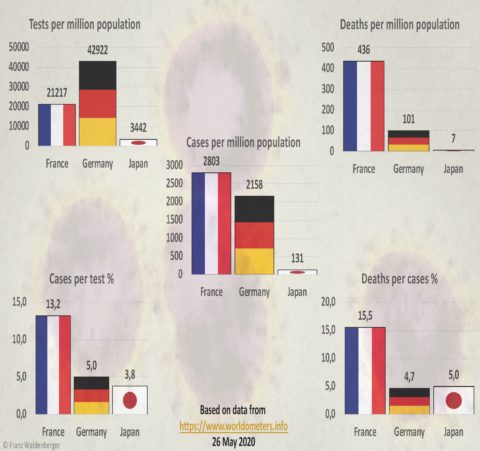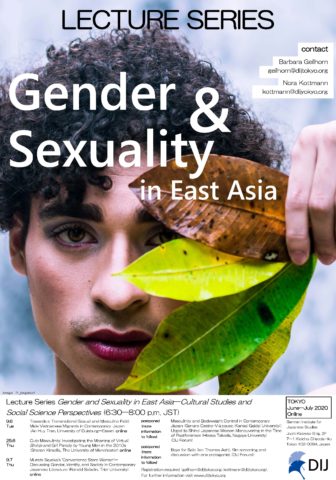イベント&アクティビティ
Webinar on ‘Tokyo Olympics Postponed: How Japanese Society Responds’
 Originally scheduled to begin on July 24, 2020, the Tokyo Olympics have been postponed to July 2021. This is a dilemma: The Olympics were supposed to present a brand-new Japan to the world, a leader in sustainability, diversity, inclusion, and a slew of other admirable goals. But almost overnight, Tokyo’s buzz of Olympic logos, countdown clocks and construction hustle have come to an eerie standstill: What now? Join sociologist and DIJ deputy director Barbara Holthus, editor of Japan Through the Lens of the Tokyo Olympics and Ulrike Schaede, former member of the DIJ’s advisory board, on July 15, 8:30 a.m. (JST) in this UC San Diego Japan Forum Webinar for a discussion of how the postponement has affected the various stakeholders in society: athletes with crushed aspirations, para-Olympians with broken dreams, disappointed volunteers, empty-handed ticket holders, devastated inn- and shopkeepers, jubilant anti-Olympic movement participants, among Tokyoites and in the periphery.
Originally scheduled to begin on July 24, 2020, the Tokyo Olympics have been postponed to July 2021. This is a dilemma: The Olympics were supposed to present a brand-new Japan to the world, a leader in sustainability, diversity, inclusion, and a slew of other admirable goals. But almost overnight, Tokyo’s buzz of Olympic logos, countdown clocks and construction hustle have come to an eerie standstill: What now? Join sociologist and DIJ deputy director Barbara Holthus, editor of Japan Through the Lens of the Tokyo Olympics and Ulrike Schaede, former member of the DIJ’s advisory board, on July 15, 8:30 a.m. (JST) in this UC San Diego Japan Forum Webinar for a discussion of how the postponement has affected the various stakeholders in society: athletes with crushed aspirations, para-Olympians with broken dreams, disappointed volunteers, empty-handed ticket holders, devastated inn- and shopkeepers, jubilant anti-Olympic movement participants, among Tokyoites and in the periphery.
Please download the event flyer for information on how to register for this event.
Future Visions of a (Digital) Public Sphere:
Findings from Japan

With the pandemic since early 2020, the use of online platforms has increased in most societies. Consequently, providers of digital platforms have gained substantial influence on how people inform themselves, for example about the novel coronavirus or political topics. However, many posts and publications include falsified or unproven data (better known as “fake news”), also in Japan. In the course of our research we raise the question how the status quo and the future of the aforementioned digital platforms can be explored collectively with regards to issues like fake news, democratic values or privacy. We argue that the resulting scenarios, which arise from the subjective experiences of their speculators and, hence, reveal individual hopes and fears, allow us to explore and discuss utopian and dystopian visions of technological futures and alternative realities. Details
Speakers:
Michel Hohendanner, Munich University of Applied Sciences
Chiara Ullstein, Technical University of Munich
Murata Sayaka’s Convenience Store Woman: Discussing Gender Identity and Society in Contemporary Japanese Literature
Lecture Series ‘Gender and Sexuality in East Asia’ (3/5)
A convenience store is a reflection of Japan’s society. The way people behave, act, react, and interact is a display of contemporary Japan’s common sense. It reveals how social life is organized in terms of interpersonal relations, habits, norms, values, etc. What, however, happens when someone does not fit Japan’s common sense? This presentation will elaborate on how Murata addresses the fundamental question of an individual’s place within society by focusing on how the novel deals with social conventions, gender constructions, and work. The analysis of these issues shows how Murata deconstructs Japan’s common sense and reveals its naturalized, unspoken, and taken-for-granted rules that organize contemporary Japanese society. Details
Speaker:
Ronald Saladin, Trier University
Cute Masculinity – Investigating the Meaning of Virtual Shōjo and Girl Parody by Young Men in the 2010s
Lecture Series ‘Gender and Sexuality in East Asia’ (2/5)
Around 2010, cute male characters, drawn visually identical to bishōjo (beautiful girl) characters, moved beyond erotic computer games (erogē) and into cosplay and cute cross-dress fashion subculture, on campuses and online. By the middle of the 2010s, M2F cute and girlish boys were also a tangible theme in advertising and major media production. The well-trained bodies and willing faces of young girls lining screens and interfaces in the city, became infiltrated by male talents and pop idols in cute cross-dress. This paper explores the pick-up and adaptation of cute as a male visual aesthetic in subcultural practices and fashion and considers its complex play with transformation and masculine identity. Details
Speaker:
Sharon Kinsella, The University of Manchester
How Real Are Numbers?
Making Sense of National COVID-19 Statistics
 DIJ MFJ Web-Forum
DIJ MFJ Web-Forum
The number of infections, reproduction numbers, doubling speeds, death rates: national pandemic statistics are updated, compared and discussed daily. The numbers are shocking, but so are the huge national differences. Why are there so few people infected in Japan? Why is the death rate in Germany so low? Why is the situation in France so bad? For sure, countries apply different testing and reporting methods. Simple comparisons are likely to be misleading. Nevertheless, these numbers are relevant as they influence important policy decisions. In our Web-Forum we ask leading experts in the field from France, Germany, and Japan to explain the apparent differences in national data related to the COVID-19 pandemic and what the numbers can really tell us about the situation in the three countries. Details
Speakers:
Ansgar Lohse, University Medical Center Hamburg-Eppendorf
Paul-André Rosental, Sciences Po Paris
Kenji Shibuya, King’s College London
You can access this online event here: https://www.youtube.com/watch?v=YnOfeA8nbts
Lecture Series: Gender and Sexuality in East Asia – Cultural Studies and Social Science Perspectives
 This lecture series sets out to explore ‘Gender and Sexuality in East Asia’ from a cultural studies and social science perspective. It is structured as a set of three online lectures to be followed by a DIJ Forum and a film screening and talk with the producer and one protagonist (dates t.b.c.). Topics that will be addressed are: Sexualities and migration, ‘new’ masculinities, ‘new’ life courses for women, gender constructions in film and literature, bodies and postfeminism.
This lecture series sets out to explore ‘Gender and Sexuality in East Asia’ from a cultural studies and social science perspective. It is structured as a set of three online lectures to be followed by a DIJ Forum and a film screening and talk with the producer and one protagonist (dates t.b.c.). Topics that will be addressed are: Sexualities and migration, ‘new’ masculinities, ‘new’ life courses for women, gender constructions in film and literature, bodies and postfeminism.
Online Lectures
An Huy Tran, University of Duisburg-Essen/Waseda University: ‘Towards a Transnational Sexual and Masculine Field: Male Vietnamese Migrants in Contemporary Japan’ (9 June)
Sharon Kinsella, The University of Manchester: ‘Cute Masculinity: Investigating the Meaning of Virtual Shōjo and Girl Parody by Young Men in the 2010s’ (25 June)
Ronald Saladin, Trier University: ‘Murata Sayaka’s ‘Convenience Store Woman’ – Discussing Gender Identity and Society in Contemporary Japanese Literature’ (7 July)
Join us to discuss these issues with internationally established scholars! Further information, incl. technical details will be announced here and on Twitter (@dij_tokyo) in due time. Download Poster
Towards a Transnational Sexual Field: Male Vietnamese Migrants in Contemporary Japan
Lecture Series ‘Gender and Sexuality in East Asia’ (1/5)
Transnational movements of people across borders have been one of the most prominent forces in shaping sexualities and genders. While migrants’ economic and labour practices have constituted a relatively wide spectrum of both academic and non-academic interests, the sexual and gendered dimensions of migration attract less attention. In particular, sexualities have historically been marginalized, and are still ‘absent as a social factor in mainstream sociological studies of migration’ (Carrillo 2017; Manalansan IV 2006). Moreover, in contrast to female migrants’ sexual and gender identities and behaviours, the sexual and gendered experiences of male movers have not been adequately investigated. Details
Speaker:
An Huy Tran, University of Duisburg-Essen/Waseda University
Access (Zoom Meeting):
https://zoom.us/j/92470344725?pwd=c09oRFFoMnRDVktvY2l5cVplT2x3QT09
Meeting ID: 924 7034 4725
Password: 329921
National Approaches to Systemic Risk:
Germany and Japan under the COVID-19 Crisis

DIJ DWIH Web-Forum
The perception, assessment, communication and containment of risks is an ongoing challenge for individuals, organizations and societies at large. The present COVID-19 pandemic reveals the profound problems countries confront and the difficult trade-offs they have to make when facing systemic risks combined with a high degree of uncertainty. It also shows remarkable differences in the way national governments, businesses and citizens are prepared for the crisis and are trying to cope with its various dimensions. In our online forum, two leading risk researchers from Japan and Germany will analyze and evaluate the crisis responses in their countries. The discussion will explore the similarities and differences in the national approaches, possible reasons and implications. Details
Speakers:
Ortwin Renn, Director, Institute for Advanced Sustainability Studies
Norio Okada, Prof. em. Kyoto University, Disaster Prevention Research Institute
You can access this online event here: https://www.youtube.com/watch?v=tdGa3jF7et0








 Open Access
Open Access
